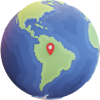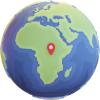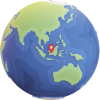Case studies are organised by region, with each region featuring links to the countries where the case studies are located.
Bolivia
A powerful Fujian/Putian criminal network based in Bolivia, has established a far-reaching collaboration network that extends to China. This network includes customs officials and Chinese-based traders. In addition to illegal logging and illegal wildlife trafficking, the group is heavily involved in illegal gold mining in the Amazonian regions of Bolivia, in an area very close to one branch of the amazon river. Informants shared that the unauthorised mining is conducted with Chinese associates, and the gold is often sold in a small town nearby. During their investigation, Earth League International (ELI) uncovered patterns of corruption involving government officials. The criminal network has been facilitating the acquisition of large procurement contracts for managing sites and roads on behalf of Chinese state-owned companies. ELI informants had also revealed that the group bribed a local politician and the indigenous village chief to gain permission to illegally dig gold mines in the smaller river areas around Rio Suapi and Rio Alto Beni.
Keywords: Latin America, Bolivia, minerals, gold, primary production, procurement of permits, illegal gold mining, corruption and bribery, serious organised crime
Source: https://earthleagueinternational.org/wp-content/uploads/2023/06/ELI-Environmental-Crime-Convergence-Report-June-2023.pdf
Brazil

A report by InSight Crime demonstrates the growing ties between drug trafficking and illegal timber logging in Brazil’s Amazon. The report details how timber shipments from the Amazon are now being used to conceal drugs, primarily cocaine, for export to foreign countries. From 2017 to 2021, authorities seized nearly nine tons of cocaine hidden within timber shipments destined for European countries. In addition to drugs being hidden in timber shipments, the ties between illegal timber logging and drug trafficking is also the consequence of organised crime groups in Brazil diversifying their activity. Indeed, organised crime groups in Brazil have also become involved in illegal mining, land grabbing, logging, gold trading, and invading indigenous lands. Criminal gangs have been known to buy land illegally in the rainforest to profit from logging and to establish marijuana plantations, particularly in Pará’s “Marijuana Polygon.”. From 2015 to 2020, more than two million marijuana plants were seized across the Amazon region, with 55% of these seizures occurring in Pará.
Keywords: Latin America, Brazil, timber, primary production, trade and transport, drug trafficking, serious organised crime, illegal logging, illegal mining
Sources: https://insightcrime.org/news/intimate-relationship-between-cocaine-illegal-timber-brazil-amazon/

According to a press release issued by the Brazilian government, an operation led by its Federal Police dismantled an international criminal organisation involved in the illegal extraction, trade, and export of precious stones, particularly rough diamonds and gold. On April 26, 2023, Brazil's Federal Police launched Operation Itamarã, which encompassed a total of 42 search and seizure warrants and eight preventive arrest warrants across several Brazilian states and involved international cooperation with the United States, Belgium, England, and the United Arab Emirates. Investigations began in 2020, as the organisation’s activities were first revealed through the arrest of a suspect at Guarulhos International Airport. The suspect was found carrying rough diamonds without proper documentation. Subsequent seizures included gold bars at Confins/MG Airport and rough diamonds intercepted with the help of U.S. Homeland Security Investigations. The operation eventually uncovered that the criminal organisation had extensive operations in over a dozen countries, involving complex financial schemes and the use of shell companies to issue false invoices. They also co-opted legitimate companies to facilitate the illegal export of precious stones.
Keywords: Latin America, Brazil, mining, diamonds, gold, illegal mining, serious organised crime, fraudulent documentation
Sources: https://www.gov.br/pf/pt-br/assuntos/noticias/2023/04/pf-deflagra-operacao-contra-organizacao-criminosa-de-extracao-e-comercio-ilegal-de-diamantes
Chile

Illegal logging is an ongoing issue in Chile and has caused extensive environmental and economic damage over several decades. The World Bank notably reports the destruction of 11,368 hectares of land and the generation of 1.2 million m³ of illegally harvested timber from 2013 to 2019. A significant consequence of the enormity of this sector is illicit activity, such as timber theft by criminal mafias. Timber theft by criminal mafias has surged, with the value of stolen wood increasing from US$20 million in 2018 to US$67.8 million in 2020. In addition, the ongoing conflict between the Mapuche Indigenous community and the government has also intensified due to logging on ancestral lands. Criminal groups exploit this situation, engaging in timber theft, creating fake invoices, and laundering illegal timber through legitimate financial structures. Investigations have revealed significant laundering through false documentation, sometimes even involving internationally certified companies. The government’s institutional framework has allowed organised crime to flourish in the timber sector. Government agencies have inadequately supervised timber companies, particularly regarding the proper use of shipping documents and invoices and the sustainable use of forest lands.
Keywords: Latin America, Chile, timber, primary production, trade and transport, illegal logging, environmental crime, fraudulent documentation, illegal timber trade, money laundering, Indigenous rights
Source: https://gfintegrity.org/illicit-activity-in-chiles-timber-sector/

Large-scale copper robberies orchestrated by organised crime groups have had a devastating impact on the Chilean copper industry. For instance, on the 11th of January 2023, 13 shipping containers, valued at $4.4 million, were stolen from the port of San Antonio after guards were subdued and cameras disabled. The Antofagasta Bolivia Railway (FCAB) has also reported over 100 attacks on copper-carrying trains from 2020 to 2023, with 39 incidents in 2022 alone. Gangs, equipped with advanced technology and heavy machinery, conduct these raids with paramilitary precision. These robberies are also highly violent, as shown when armed men kidnapped workers in Antofagasta to facilitate a copper robbery in May 2021. Organised crime groups also frequently attack police and companies’ security teams, sometimes resulting in murder. The scale and level of violence of these copper robberies has increased drastically over the past few years. While copper robbery has always been frequent in Chile, the methods used are now much more developed, allowing for better organised, larger and more effective heists.
Keywords: Latin America, Chile, minerals, copper, serious organised crime
Sources: https://insightcrime.org/news/chile-copper-industry-robbers-ports-trains/
Colombia

In Santander, a region of Colombia, corruption is a common practice in the timber industry. Timber traders will exploit the regulatory, police, and judicial systems in order to enable the illegal trafficking of wood. Government agencies, such as the Autonomous Corporation of Santander (CAS) and the Corporation for the Defense of the Bucaramanga Plateau (CDMB), which are responsible for regulating timber extraction, have become riddled with corruption. Officials within these bodies have been found to issue false permits, recycling old ones and creating fake licences to launder illegally sourced timber. Police officers, bribed by the criminal organisations, frequently allow trucks carrying illegal timber to pass through checkpoints. In addition to this, the judicial system is also compromised, with prosecutors being influenced by bribes to exploit procedural loopholes. This allows seized timber to be returned to traffickers. An example of this corrupt behaviour is the Los Ingenieros criminal network’s use of intermediaries. These individuals will manage the logistics of illegal timber transport, securing false permits, and connecting loggers with buyers. Businessmen in major cities including Bogotá or Bucaramanga purchase timber through these intermediaries. This corruption has led to widespread deforestation in natural reserves such as Yariguíes National Park, while key figures often evade punishment.
Keywords: Latin America, Colombia, timber, primary production, trade and transport, corruption and bribery, serious organised crime, illegal timber trade, illegal logging, fraudulent documentation, deforestation
Sources: https://insightcrime.org/investigations/colombia-purveyors-illegal-wood/

Research from NGO Verité found that up to 91% of Venezuela’s and 87% of Colombia’s gold exports are illegally produced, often controlled by organised crime groups backed by large-scale investments. Some of the world’s most active organised crime groups and non-state armed groups are reportedly directly involved in the production and sale of such illegal gold, including Mexico’s Sinaloa cartel and Italy’s ’Ndrangheta mafia, as well as Brazilian, Russian, and Chinese syndicates.
Illegally produced gold from Latin America is exported to refineries (with the help of corrupt officials), melted down and blended with legally produced and scrap gold, or mixed to make alloys, then exported to global markets. Canada and the US are the biggest importers of Latin American gold – indeed, the latter’s gold imports from Latin America exceed the volume of gold that Latin America claims to export.
Whilst Switzerland is responsible for refining around 70% of globally-produced gold, some of the county’s refineries have stopped purchasing gold from Latin American suppliers linked to illegal gold mining and human rights abuses, leaving a gap in the market which US refineries have rushed to fill, purchasing this surplus gold in Switzerland’s place and introducing it to global markets. Indeed, Verité found that 90% of the Fortune 500 companies that filed conflict mineral disclosures last year (from across telecoms, IT, car manufacturers, and machinery producers) had purchased gold from refineries linked to illegally mined gold from Latin America.
In 2022, over 320 illegal gold mines were counted in the nine states that make up Brazil’s Legal Amazon. Major drug trafficking factions, including the Primeiro Comando da Capital, have infiltrated mining operations in Indigenous territories, running protection rackets, extorting taxes, controlling pits, and forging partnerships with gangs in neighbouring Venezuela to sell contraband minerals. Gold is also the top export of Bolivia, with the mining region transecting national parks and reserves.
Keywords: Latin America, Colombia, minerals, gold, primary production, serious organised crime illegal mining, corruption and bribery, drug trafficking, tax evasion, Indigenous rights, human rights violations, gold trafficking
Source: https://www.theguardian.com/global-development/2016/aug/16/illegal-mines-local-mafia-take-shine-off-latin-american-gold-peru
Côte d'Ivoire

Côte d’Ivoire, the world’s top cocoa producer, is experiencing devastating deforestation driven by its principal economic activity, cocoa farming. Farmers typically rely on the natural soil fertility of virgin forests for high cocoa yields, leading to forests being cleared for cocoa cultivation. After five to ten years, when soil fertility dwindles, farmers move to the next fresh two to three acres of virgin forest to plant a new crop. This practice has led to a fourfold increase in deforestation in Saamaka lands and the growth of towns and villages in protected forest areas. To diversify and increase their income, some farmers make profitable deals with logging companies and illegal timber traders to remove trees to make way for cocoa crops. This practice has proved more lucrative for farmers than cocoa bean production, making illegal logging arguably one of the country’s most prevalent and lucrative forms of organised crime.
Keywords: Sub-Saharan Africa, Cote d’Ivoire, cocoa, primary production, deforestation, illegal timber trade, illegal logging, organised crime
Source: https://issafrica.org/iss-today/shady-cocoa-farming-at-the-root-of-cote-divoires-deforestation
Ecuador

Los Lobos, a narco-trafficking gang affiliated with Mexico’s notorious Jalisco New Generation cartel, has infiltrated illegal gold mining in Ecuador. Their activities have reached remote areas, including Podocarpus National Park, where they extort miners and dominate almost all stages of the gold supply chain. Each miner is forced to pay an extortion fee of up to $1,000 every month to the gang, leading to violent clashes in instances of non-compliance, with several local officials opposed to illegal mining being attacked or even murdered.
As criminal organisations in the region who have traditionally focused on drug trafficking expand into other criminal activities, the rising value of gold on international markets and the ease of laundering profits from the cocaine trade have made gold mining increasingly attractive to them.
Keywords: Latin America, Ecuador, mining, primary production, gold, serious organised crime, drug trafficking, illegal mining, murder, money laundering, extortion
Source: https://news.mongabay.com/2024/05/ecuadors-los-lobos-narcotrafficking-gang-muscles-in-on-illegal-gold-mining/
Guatemala

A Mongabay report warns that organised crime is exerting unprecedented pressure on Guatemala's largest rainforest, the Maya Biosphere Reserve. The reserve has faced a wave of land invasions since the beginning on 2024, including in previously untouched areas such as Naachtún-Dos Lagunas Biotope. The invaders, often heavily armed, are backed by criminal groups seeking to exploit the government's agrarian reform policies to launder money through cattle ranching and drug trafficking across the Mexican border. As a result, the reserve is experiencing severe threats from deforestation, illegal livestock farming, and forest fires. In March 2024, a patrol discovered extensive markings and a road being cleared in Mirador National Park, signalling a planned large-scale invasion. Despite arrests and patrols, the encroachment persists. Mongabay also explains that the situation is exacerbated by the political transition with the inauguration of President Bernardo Arévalo, whose government supports rural and Indigenous communities. Proposed reforms to Guatemala's protected areas law could loosen restrictions on agriculture and livestock in the reserve in order to address longstanding issues related to land ownership, further endangering the area.
Keywords: Latin America, Guatemala, cattle, primary production, serious organised crime, agriculture, drug trafficking, illegal production, deforestation, money laundering
Sources: https://news.mongabay.com/2024/05/organized-crime-puts-unprecedented-pressure-on-guatemalas-largest-rainforest/


The Environmental Crimes Financial Toolkit is developed by WWF and Themis, with support from the Climate Solutions Partnership (CSP). The CSP is a philanthropic collaboration between HSBC, WRI and WWF, with a global network of local partners, aiming at scaling up innovative nature-based solutions, and supporting the transition of the energy sector to renewables in Asia, by combining our resources, knowledge, and insight.


